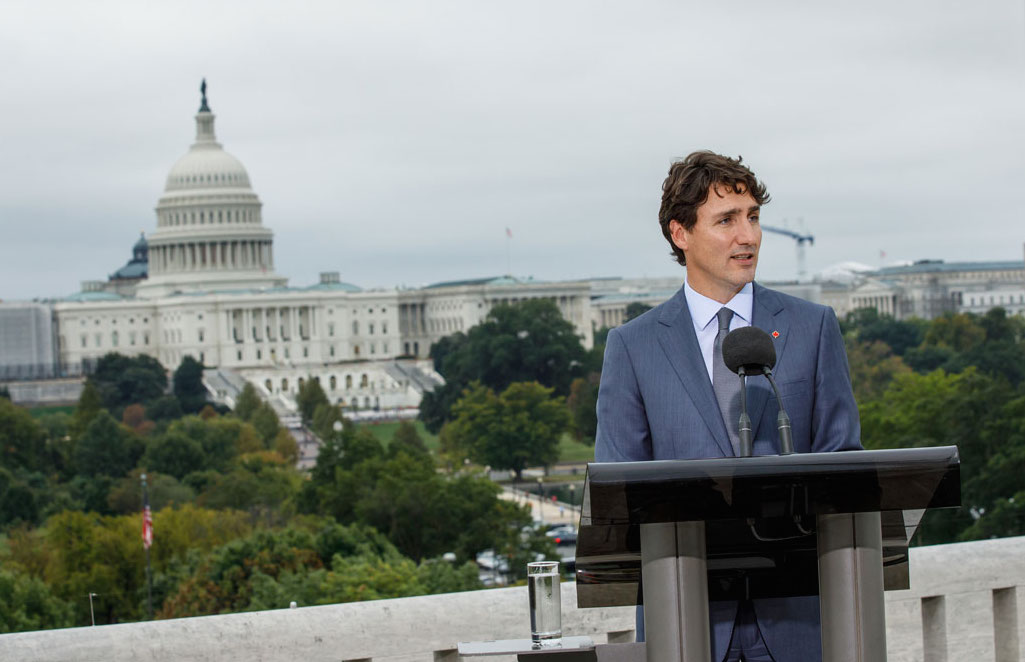In the U.S. May 16-18 to visit with American business leaders in Boston and New York, Justin Trudeau received an honorary doctorate from New York University, where he gave the commencement address.
In his Yankee Stadium speech to the assembled families and friends of the 2018 NYU graduating class, Trudeau first invoked the benefits of a trip around the world he had taken with some friends after his own graduation, which brought him into contact with beliefs and ideas that he had previously not explored.
In what amounted to a mild liberal rebuke to postmodernism, Trudeau warned of the danger in taking on the outlook of the “tribe” as the way of looking at the world.
Without making a direct appeal to the universal or to global solidarity, Trudeau urged the graduates to eschew aggressive nationalism, which he likened to dividing the world on a tribal basis.
Speaking directly to graduates about their possibilities and responsibilities for the future, Justin Trudeau pointed to the pressing need to break outside the usual circle of the likeminded, and to seek out people with different views and divergent experiences.
At a time of high partisan tensions in U.S. politics, with an American president dividing his nation over basic issues of right and wrong, Trudeau was unafraid to suggest that mutual respect was possible, and desirable, when dealing with others.
Trudeau observed tellingly that a commitment to diversity meant more than practicing tolerance with respect to others. Recognition of differences required that graduates reach out to people, whatever their origins, culture or ideas.
A proponent of pluralism, the self-described admirer of Sir Wilfrid Laurier (his second-favourite Canadian PM, he said with a wink) suggested students should learn to test their ideas against those that differ from their own. People should not be afraid to correct views that are proven wrong, and should be quick to recognize that others could have better ideas.
Certainly no one is going to confuse the Trudeau speech with the appeal to peace made by Pope Paul VI at the old Yankee Stadium in October 1965. Indeed, Trudeau said nothing about issues of war and peace, though they are at the top of the American political agenda.
The soft appeal to liberal pluralism from second base on the celebrated baseball diamond made no mention of poverty, unemployment or social distress.
As 2018 president of the G7, Trudeau will be at the centre of debate over economic issues this coming July at the Charlevoix summit; however, the prime minister did not share his thoughts on the direction of the world economy with his audience.
Unlike French President Emmanuel Macron who did not hold back in criticizing American policies in his well-received address to a joint session of the U.S. Congress, Trudeau pointed to no divergences of views between his government and the U.S. government.
Despite the university setting, Trudeau did not address issues of student debt or educational opportunities or research possibilities.
Certainly Trudeau could have called attention to the work of Canadian scholars well known at NYU, such as Charles Taylor and Will Kymlicka, to strengthen his arguments in favour of liberal pluralism and deepen his appeal to a well-educated audience.
Since one purpose of a university education is to allow students to challenge views received from their families and those widely held in societies, much of the Trudeau address to the 2018 NYU graduates applied as much to high school seniors as to those receiving first or advanced university degrees.
A university curriculum of study allows students to go back and examine how ideas about important subjects such as scientific advance, aesthetics, justice, or prosperity have been debated and decided in the past and to reflect on how those should be changed or renewed today.
A university education should help someone look out at the world and analyze what they see. It is of less help in knowing what to do next, which is the daunting task facing the class of 2018.
Getting a liberal narrative from the Canadian prime minister will do no harm, but as graduates decide on what to draw upon as the future looms, they will need more than the resources of liberalism lite can provide to help them deal with the major issues of our times.
Duncan Cameron is president emeritus of rabble.ca and writes a weekly column on politics and current affairs.




